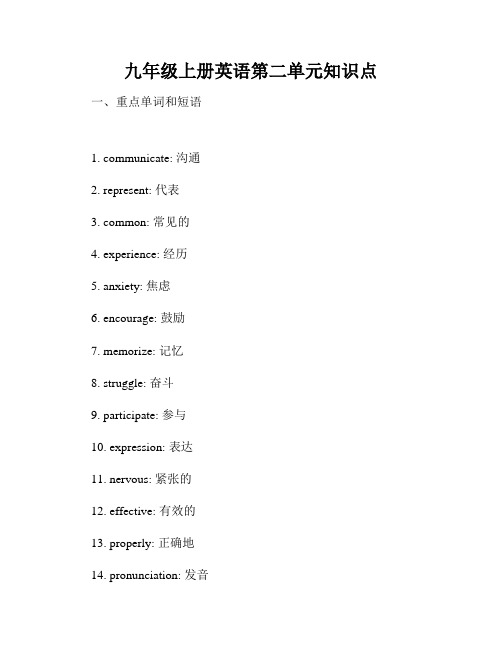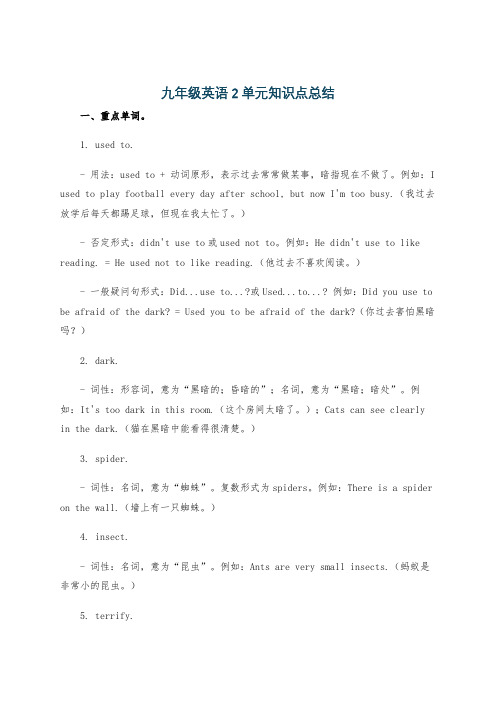九年级英语第二单元知识点梳理
- 格式:doc
- 大小:38.00 KB
- 文档页数:3

九年级英语全册Unit 2知识点【Section A】一、重点单词及词组1.safety 意为“安全;安全性” , 作不可数名词时Safely adv.→反义词 dangerously adv.Safe adj.→反义词 dangerous adj.Safety n.→反义词 danger n.例:For your own safety, please do not smoke inside the plane.为了你自身的安全,请不要在飞机内抽烟。
2.smoke 意为“吸烟”,还可以指“冒烟” v.例:You had better give up smoking.你最好放弃吸烟。
What makes the stove smoke? 什么导致炉子冒烟?[拓展]smoke 用作不可数名词,意为“烟”。
例:The room was filled with smoke.屋里都是烟。
3.part-time兼职的 adj.其反义词是full-time,意为“全职的“。
Have part-time Jobs 意为“做兼职工作”。
例:In America, many students have part-time jobs.在美国,很多学生做兼职工作。
4.hug 拥抱,搂抱①[可数名词]拥抱 give sb a hug例:She gave her mother a big hug.她热情地拥抱了她的母亲。
②[动词]拥抱,其过去式和过去分词为hugged,现在分词为hugging。
例:They hugged each other.他们相互拥抱。
5.lift 举起,抬高;电梯,搭便车。
①[动词]举起,抬高;指用手或机器等把某人或某物举到一定等高度。
例:The old man can’t lift the box.这个老人举不起这个箱子。
She lifted her hand all of a sudden.她突然举起手来。

人教版英语九年级全一册unit2笔记以下是Unit 2的课堂笔记,包括了重要单词、短语、句型以及语法知识点:Unit 2 重要单词:1. adj. 疲倦的:tired2. v. 放松:relax3. adj. 焦虑的:anxious4. v. 害怕:fear5. n. 经验:experience6. v. 欣赏:appreciate7. n. 机会:opportunity8. v. 实现:achieve9. n. 目标:goal10. v. 挑战:challengeUnit 2 重要短语:1. take a deep breath 深呼吸2. hold my hand 握住我的手3. calm down 冷静下来4. get butterflies in my stomach 心头鹿撞5. worry about 为...担心6. be nervous about 对...感到紧张7. be anxious about 对...感到焦虑8. be scared of 对...感到害怕9. look forward to 盼望,期待10. in the future 在未来Unit 2 重要句型:1. I feel tired these days. (现在时态,描述当前状态)2. I was really nervous before the big speech. (过去时态,描述过去发生的动作)3. I will challenge myself to do things I didn't think I could do before. (将来时态,描述将来的动作)4. It's important to learn how to deal with stress. (形式主语,强调某事的重要性)5. I look forward to hearing from you. (固定句型,表示期待)6. I have a goal to achieve. (动词不定式作后置定语,表示目标)7. It's a waste of time doing sth. (动名词作主语,表示某事是浪费时间)8. I'm sorry to hear that you're feeling down. (固定句型,表示同情或安慰)9. The best way to relax is through exercise. (动词不定式作后置定语,表示放松的最好方式)10. I will try my best to get the job. (动词不定式作目的状语,表示努力) Unit 2 语法知识点:1. 现在完成时态(Present Perfect Tense):用于描述过去发生的动作对现在的影响或结果。

九年级上册英语第二单元知识点一、重点单词和短语1. communicate: 沟通2. represent: 代表3. common: 常见的4. experience: 经历5. anxiety: 焦虑6. encourage: 鼓励7. memorize: 记忆8. struggle: 奋斗9. participate: 参与10. expression: 表达11. nervous: 紧张的12. effective: 有效的13. properly: 正确地14. pronunciation: 发音15. progress: 进步二、重点语法1. 一般现在时:表示经常性、习惯性的动作或事实。
例如:She always gets up early.2. 现在进行时:表示现在进行的动作。
例如:They are playing basketball now.3. 一般过去时:表示过去发生的动作或状态。
例如:I saw a movie yesterday.4. 过去进行时:表示过去某一时刻正在进行的动作。
例如:She was studying when I called her.5. 一般将来时:表示将来要发生的动作或事件。
例如:We will visit Beijing next month.三、重点句型1. How do you communicate with your friends?你是如何与你的朋友沟通的?2. I usually talk to them on social media.我通常在社交媒体上与他们交谈。
3. English is important for communication.英语对于沟通来说很重要。
4. I have some experience in learning English.我在学习英语方面有一些经验。
5. Don't be nervous and just enjoy the process.不要紧张,尽情享受这个过程。

九年级英语2单元知识点总结一、重点单词。
1. used to.- 用法:used to + 动词原形,表示过去常常做某事,暗指现在不做了。
例如:I used to play football every day after school, but now I'm too busy.(我过去放学后每天都踢足球,但现在我太忙了。
)- 否定形式:didn't use to或used not to。
例如:He didn't use to like reading. = He used not to like reading.(他过去不喜欢阅读。
)- 一般疑问句形式:e to...?或Used...to...? 例如:Did you use to be afraid of the dark? = Used you to be afraid of the dark?(你过去害怕黑暗吗?)2. dark.- 词性:形容词,意为“黑暗的;昏暗的”;名词,意为“黑暗;暗处”。
例如:It's too dark in this room.(这个房间太暗了。
);Cats can see clearlyin the dark.(猫在黑暗中能看得很清楚。
)3. spider.- 词性:名词,意为“蜘蛛”。
复数形式为spiders。
例如:There is a spider on the wall.(墙上有一只蜘蛛。
)4. insect.- 词性:名词,意为“昆虫”。
例如:Ants are very small insects.(蚂蚁是非常小的昆虫。
)5. terrify.- 词性:动词,意为“使害怕;使恐惧”。
常见搭配:terrify sb.例如:The loud noise terrified the baby.(巨大的噪音吓坏了婴儿。
)- 形容词形式:terrified(感到害怕的,用来形容人)和terrifying(令人害怕的,用来形容事物)。

人教版九年级英语第二单元知识点总结一、重点词汇解析1.mooncake /ˈmuːnkeɪk/ 月饼-解析:由moon(月亮)和cake(蛋糕)组成,是中秋节的传统食品。
-例句:We eat mooncakes on Mid-Autumn Festival.(我们在中秋节吃月饼。
)ntern /ˈlæntən/ 灯笼-解析:一种照明工具,通常在节日中使用。
-例句:There are many beautiful lanterns in the park.(公园里有很多漂亮的灯笼。
)3.stranger /ˈstreɪndʒə(r)/ 陌生人-解析:不认识的人。
-例句:Don't talk to strangers.(不要和陌生人说话。
)4.relative /ˈrelətɪv/ 亲属;亲戚-解析:和自己有血缘或婚姻关系的人。
-例句:We visited our relatives during the holiday.(我们在假期拜访了亲戚。
)5.put on 增加(体重);发胖-解析:指身体的重量增加。
-例句:She has put on some weight.(她长胖了一些。
)y /leɪ/ 放置;安放;产(卵);下(蛋)-解析:过去式和过去分词分别为laid /leɪd/。
-例句:She laid the book on the table.(她把书放在桌子上。
)二、重点短语1.the Water Festival 泼水节-解析:一些国家和地区的传统节日。
-例句:The Water Festival is very lively.(泼水节非常热闹。
)2.the Dragon Boat Festival 端午节-解析:中国的传统节日,有赛龙舟、吃粽子等习俗。
-例句:We eat zongzi on the Dragon Boat Festival.(我们在端午节吃粽子。
)3.the Spring Festival 春节-解析:中国最重要的传统节日。

九年级英语知识点第二单元第二单元: 九年级英语知识点1. 时态与语态 (Tenses and Voice)在英语语法中,动词时态和语态的正确运用是非常重要的。
以下是九年级学生在第二单元应该了解的时态和语态知识点:1.1 一般现在时 (Simple Present Tense)一般现在时用于表示经常性或普遍性的动作、情况或习惯。
它的结构是“主语 + 动词原形”。
例句:- She plays the piano every day. (她每天弹钢琴。
)- They live in a big house. (他们住在一所大房子里。
)1.2 一般过去时 (Simple Past Tense)一般过去时用于表示过去某个时间发生的动作或状态。
它的结构是“主语 + 动词过去式”。
例句:- He studied English last night. (他昨晚学习了英语。
)- We went to the beach last summer. (去年夏天我们去海滩了。
)1.3 一般将来时 (Simple Future Tense)一般将来时用于表示将来发生的动作或情况。
它的结构是“主语 + will + 动词原形”。
例句:- I will visit my grandparents this weekend. (这个周末我会去看望我的祖父母。
)- They will have a party for their anniversary. (为了他们的周年纪念,他们将会举办一个聚会。
)1.4 现在进行时 (Present Continuous Tense)现在进行时用于表示现在正在进行的动作。
它的结构是“主语 + am/is/are + 动词的ing形式”。
例句:- She is studying for her exam at the moment. (她此刻正在为考试而学习。
)- They are playing soccer in the park. (他们正在公园里踢足球。
九年级上册英语第二单元知识点梳理1. 词汇本单元主要涉及以下词汇:- appliance - 家用电器- behavior - 行为- daily routine - 日常事务- electronic device - 电子设备- etiquette - 礼仪- household chores - 家务事- manage - 管理- responsibility - 责任- schedule - 日程安排- task - 任务2. 语法本单元涉及以下语法知识:- 现在进行时:用于描述正在进行的动作或状态。
- 句型结构:主语 + am/is/are + 动词 + -ing。
例如:- I am watching a movie now.- She is studying for the test.- They are playing football in the park.3. 口语表达在本单元中,我们研究了一些日常生活中的口语表达。
- How do you manage your time? - 你是如何管理时间的?- What are your daily responsibilities? - 你的日常责任是什么?- Can you help me with this task? - 你能帮我做这个任务吗?- I need to do my household chores. - 我需要做家务事。
- It's important to have good etiquette. - 有良好的礼仪很重要。
4. 情景对话本单元涉及以下情景对话:1. 在朋友家拜访的对话2. 家庭成员分担家务的对话3. 大家分享日常事务的对话4. 讨论日程安排的对话通过这些情景对话,我们可以研究如何运用所学的语言知识来进行实际交流。
以上是九年级上册英语第二单元的知识点梳理。
希望对你的学习有所帮助!。
Unit 2 I think that mooncakes are delicious!一、重点单词stranger n. 陌生人steal v. 偷;窃取lay v. 放置;安放;产(卵);下(蛋)dessert n(饭后)甜点;甜食garden n. 花园;园子admire v. 欣赏;仰慕tie n. 领带v. 捆;束trick n. 花招;把戏treat n. 款待;招待v. 招待;请(客)lie v. 平躺;处于dead adj. 死的;失去生命的business n. 生意;商业punish v. 处罚;惩罚warn v. 警告;告诫nobody pron. 没有人warmth n. 温暖;暖和spread v. 传播;展开n. 蔓延;传present n. 现在;礼物adj. 现在的relative n. 亲属;亲戚二、重点短语put on 增加(体重);发胖in two weeks 两星期之后be similar to... 与.......相似plan to do...打算做...lay out 摆开;布置end up最终成为;最后处于share sth. with sb. 与……分享……as a result结果one,. . the other... (两者中的)一个……另一个……dress up 乔装打扮play a trick on sb.捉弄某人give out 分发care about….. 关心warn sb. to do sth.警告某人做某事remind....o f... 使。
回想起promise to do sth.承诺做某事like best 最喜欢used to do sth 过去常常做某事in need 在困难中so...that...如此..以致于... between....and... 在...和..之间not only...but (also)..不但...而且...三、单元重点、难点精讲1. lie vi. 平躺;位于lay - lain - lyingIf you feel unwell, go and lie down.如果你感到不舒服,就去躺下。
九年级英语第二单元知识总结Unit 2 Knowledge SummaryIn Unit 2, we learned about various topics related to communication. Here is a summary of the key points:1. Types of Communication:- Verbal communication: Using words to convey messages through speaking or writing.- Nonverbal communication: Expressing messages through gestures, body language, facial expressions, etc.- Visual communication: Using images, graphs, charts, and other visual aids to convey information.2. Effective Communication:- Clear and concise language: Using simple and understandable language to express ideas.- Active listening: Paying full attention to the speaker and providing feedback.- Respectful communication: Being polite and considerate towards others when expressing opinions.- Nonverbal cues: Understanding and responding to the body language and gestures of others.3. Communication Skills:- Speaking skills: Being able to express ideas clearly, using appropriate tone and volume.- Writing skills: Communicating effectively through written texts, considering the target audience.- Presentation skills: Delivering information or ideas confidently and engagingly in front of an audience.- Teamwork skills: Collaborating with others, contributing ideas, and actively participating in group discussions.4. Technologies and Communication:- Digital communication: Using electronic devices and platforms such as email, social media, and video calls to communicate.- Advantages and disadvantages of technology: Increased accessibility and efficiency but potential for misunderstandings and reduced face-to-face interactions.5. Cultural Communication:- Understanding cultural differences: Being aware of cultural norms, values, and customs when communicating with people from different backgrounds.- Respect and tolerance: Valuing diversity and avoiding stereotypes or prejudices in communication.6. Conflict Resolution:- Active listening: Understanding the concerns and viewpoints of others in a conflict.- Effective negotiation: Finding compromises and solutions that satisfy everyone involved.- Respectful communication: Expressing opinions without being aggressive or disrespectful.Remembering these communication concepts and skills can help us become better communicators and build stronger relationships with others.。
九年级英语第二单元知识点整理九年级英语第二单元的知识点整理如下:1. 一般过去时:表示过去某个时间发生的动作或存在的状态。
如:I watched a movie last night.(昨晚我看了一部电影。
)2. 常见的一般过去时的时间状语词:yesterday(昨天)、last (上一个)、ago(以前)、in(在……年代)等。
3. 一般过去时的肯定句结构:主语 + 动词过去式 + 其他。
例如:He visited his grandparents.(他去拜访了他的祖父母。
)4. 一般过去时的否定句结构:主语 + didn't + 动词原形 + 其他。
例如:They didn't go to the park.(他们没有去公园。
)5. 一般过去时的一般疑问句结构:Did + 主语 + 动词原形 + 其他?例如:Did you finish your homework?(你完成作业了吗?)6. 特殊疑问句的结构:疑问词 + 一般疑问句结构。
例如:What did she do yesterday?(她昨天做了什么?)7. 过去时间状语的用法:用于修饰动词,并放在动词的前面或句子的末尾。
8. 现在完成时:表示过去发生的动作对现在造成的影响或结果。
主要由"have/has + done"构成。
9. 一般过去时和现在完成时的区别:一般过去时表示过去发生的具体时间的动作或状态,而现在完成时表示过去发生的动作与现在的关系。
10. 虚拟条件句:表示与现在或将来事实相反的假设或推测。
主要由"if + 过去式,would/could + 动词原形"构成。
11. 虚拟语气的用法:用于表示目前还未实现或不可能实现的情况。
12. 时间状语从句:修饰整个主句的状语从句,时间状语从句放在主句之前或之后。
常见的时间状语从句引导词有:when (当……时候)、while(当……的时候)、before(在……之前)、after(在……之后)等。
Unit2
1. used to do sth. 过去常常做某事
否定形式:didn’t use to do sth. / used not to do sth.
如:He used to play football after school. 放学后他过去常常踢足球。
Did he use to play football? Yes, I did. No, I didn’t.
He didn’t use to smoke. 他过去不吸烟。
2. 反意疑问句
①肯定陈述句+否定提问如:Lily is a student, isn’t she?
Lily will go to China, won’t she?
②否定陈述句+肯定提问如:
She doesn’t come from China, does she?
You haven’t finished homework, have you?
③提问部分用代词而不用名词Lily is a student, isn’t she?
④陈述句中含有否定意义的词,如:little, few, never, nothing, hardly等。
其反意疑问句
用肯定式。
如:
He knows little English, does he?他一点也不懂英语,不是吗?
They hardly understood it, did they?他们几乎不明白,不是吗?
3. play the piano弹钢琴
4. ①be interested in sth. 对…感兴趣
②be interested in doing sth. 对做…感兴趣
如:He is interested in math, but he isn’t interested in speaking
English. 他对数学感兴趣,但是他对说英语不感兴趣。
5. interested adj. 感兴趣的,指人对某事物感兴趣,往往主语是人
interesting adj.有趣的,指某事物/某人具有趣味,主语往往是物
6. still 仍然,还
用在be动词的后面如:I’m still a student.
用在行为动词的前面如:I still love him.
7. the dark 天黑,晚上,黑暗
8. 害怕…be terrified of sth. 如:I am terrified of the dog.
be terrified of doing sth. 如:I am terrified of speaking.
9. on 副词,表示(电灯、电视、机械等)在运转中/打开,
其反义词off. with the light on 灯开着
10. walk to somewhere 步行到某处walk to school 步行到学校
11.spend 动词,表示“花费金钱、时间”
①spend…on sth. 在某事上花费(金钱、时间)
②spend…doing sth. 花费(金钱、时间)去做某事如:
He spends too much time on clothes. 他花费太多的时间在衣着
He spend 3 months building the bridge.他花费了三个月去建这座桥。
Pay for 花费
如:I pay 10 yuan for the book. 我花了10元买这本书。
12. take 动词有“花费”的意思常用的结构有:
take sb. … to do sth. 如:It takes me a day to read the book.
take … to do sth.
13. chat with sb. 与某人闲聊如:I like to chat with him.
我喜欢和他聊天。
14. worry about sb./ sth. 担心某人/某事worry 是动词
be worried about sb./sth. 担心某人/某事worried 是形容词
如:Don’t worry about him. 不用担心他。
Mother is worried about her son. 妈妈担心他的儿子。
15. all the time 一直、始终
16. take sb. to + 地方送/带某人去某个地方如:
A person took him to the hospital. 一个人把他送到了医院。
Lui took me home. 刘把我送回了家。
(home 的前面不能用to)
17. hardly adv. 几乎不、没有
hardly ever 很少
hardly 修饰动词时,通常放在助动词、情态动词之后,实义
动词之前助动词/情态动词+hardly
hardly + 实义动词如:
I can hardly understand them. 我几乎不能够明白他们。
I hardly have time to do it. 我几乎没有时间去做了。
18. miss v. 思念、想念、错过
19. in the last few years. 在过去的几年内常与完成时连用如:
I have lived in China in the last few years.
在过去的几年内我在中国住。
20. be different from 与…不同
21. how to swim 怎样游泳
不定式与疑问词连用:动词不定式可以和what, which, how, where, when 等引导的疑问句连用,构成不定工短语。
如:
The question is when to start. 问题是什么时候开始。
I don’t know where to go. 我不知道去哪。
22. make sb./ sth. + 形容词make you happy
make sb./ sth. + 动词原形make him laugh
23. move to +地方搬到某地如:I moved to Beijing last year.
24. it seems that +从句看起来好像……如:
It seems that he has changed a lot. 看起来他好像变了许多。
25. help sb. with sth. 帮某人某事
help sb. (to ) do sth. 帮某人做某事
She helped me with English.她帮助我学英语。
She helped me (to) study English。
她帮助我学习英语。
26. fifteen-year-old 作形容词15岁的
fifteen-year-olds 作名词指15岁的人
fifteen years old 指年龄15岁如:
a fifteen-year-old boy一个15岁的男孩
Fifteen-year-olds like to sing. 15岁的人喜欢唱歌。
I am fifteen years old . 我是15岁。
27.支付不起…can’t /couldn’t afford to do sth.
can’t / couldn’t afford sth.
如:I can’t/couldn’t afford to buy the car.
I can’t/couldn’t afford the car. 我买不起这个辆小车。
28. as + 形容词./副词+as sb. could/can 尽某人的…能力如:
Zhou run as fast as her could/can. 她尽她最快的能力去跑。
29. get into trouble with 遇到麻烦
30. in the end 最后
31. make a decision 下决定下决心
32. to one’s surprise 令某人惊讶如:
to their surprise令他们惊讶to LiLei’s surprise令李雷惊讶33. take pride in sth. 以…而自豪如:
His father always take pride in him. 他的爸爸总是以他而自豪34. pay attention to sth. 对…注意,留心如:
You must pay attention to your friend. 你应该多注意你的朋友。
35. be able to do sth. 能做某事如:
She is able to do it. 她能够做到。
36. give up doing sth. 放弃做某事如:
My father has given up smoking. 我爸爸已经放弃吸烟了。
37.不再①no more == no longer 如:
I play tennis no more/ longer.我不再打网球。
②not …any more == not …any longer如:
I don’t play tennis any more/longer. 我不再打网球。
38. go to sleep 入睡。